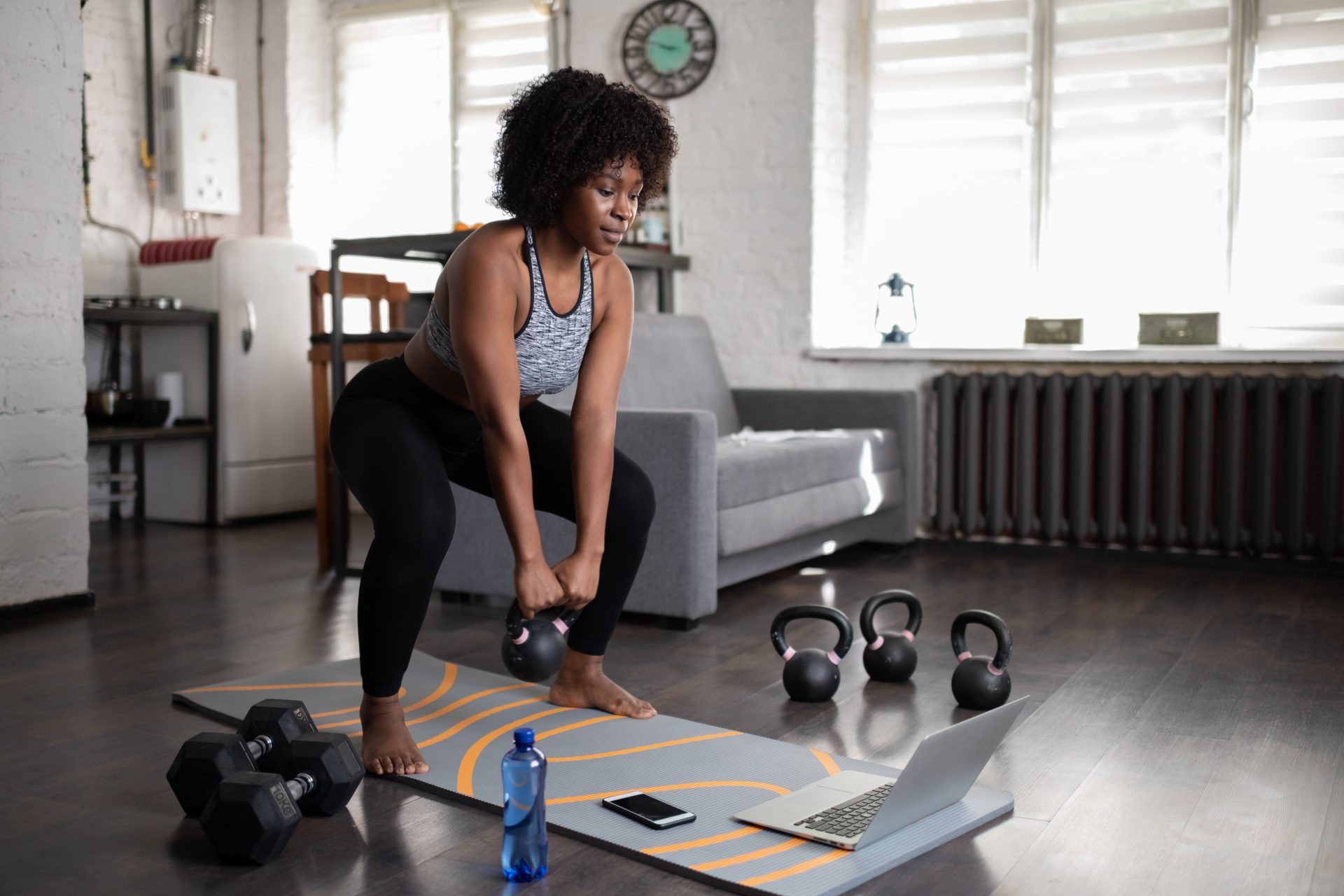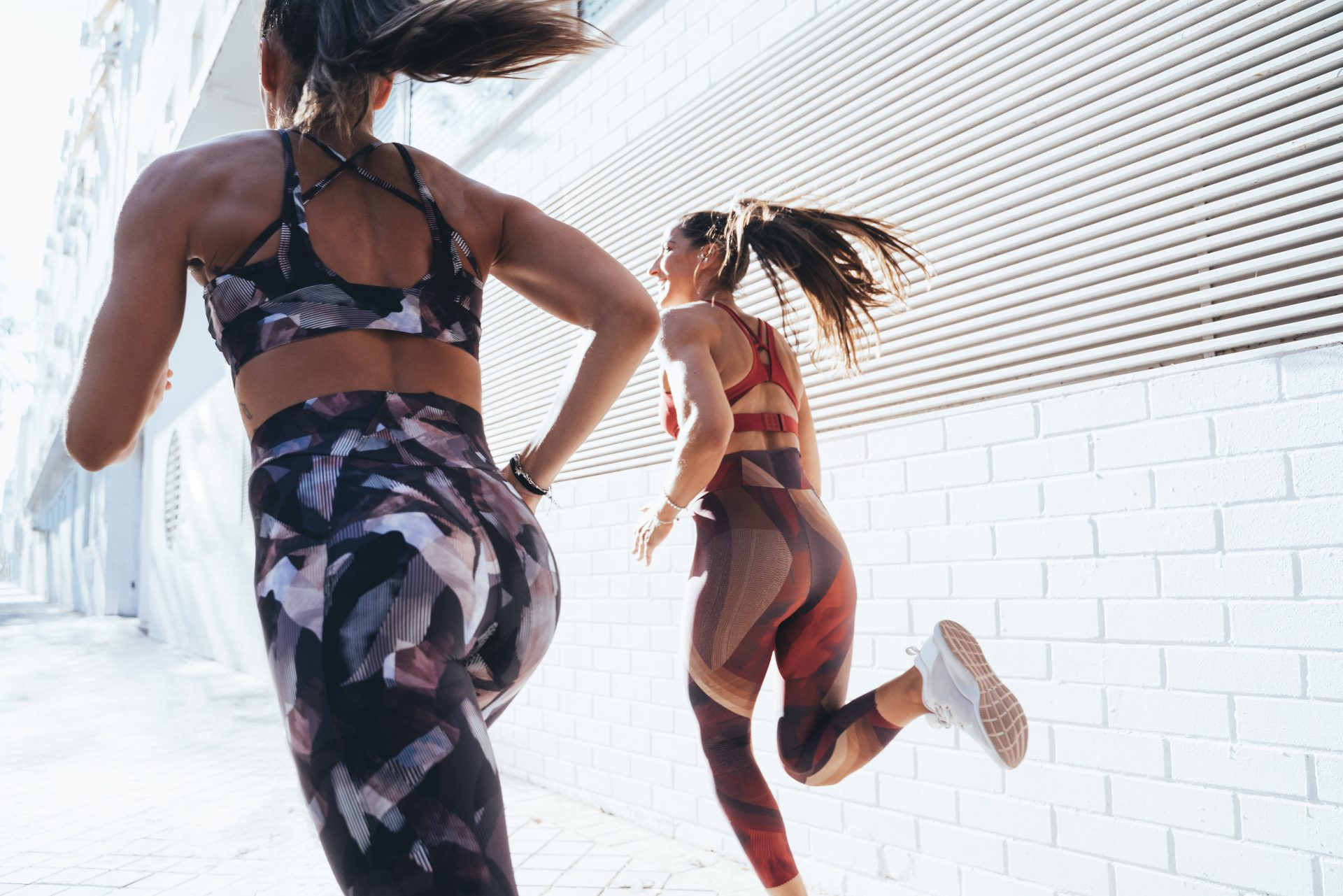Not everyone loves the idea of exercising with strangers but for writer Zoe Paskett, moving with a group of women online whom she’d never met was the best thing she could have done for her body, mind and fitness regime.
It’s 8:30am and I’m face down on my bedroom floor after doing half a burpee. The online live class continues as I lie there willing myself to get up. I don’t. I wait until the burpee bit is over and then join in again. To be fair, burpees have never been my forte, but at this moment I’m reminded of how fit I was 10 years ago and it’s a little disconcerting.
Losing a skill happens so gradually while you’re preoccupied with other things, that by the time it’s gone, it feels like you simply have to let it go and move on. That’s all very well if we’re talking about calligraphy or playing the trumpet, but when it comes to fitness, there’s a lot more to be dealing with. Making the uphill trudge back to exercising after an extended absence is not only physically painful. It can be demoralising, destabilising and often just very lonely.
You may also like
Home workouts: 3 ways to use household items as weights
For me, the idea of exercising has always been tied up with pressure and guilt, and untangling that will probably take as long as it took to tangle it up in the first place. If you’re not already fit — or you were and you’re not anymore — the fears about doing it wrong, embarrassing yourself or not being up to everyone else’s standards can build into something that seems impossible to overcome. And the longer it goes on, the worse it gets. The gym becomes terrifying. Running becomes mortifying. The spin class you used to go to becomes completely alien. I think a lot of women can relate, and we’re paralysed by feeling so far behind.
But last year, in the midst of multiple life changes where everything felt out of my control, I had what I can only describe as a moment of epiphany when I thought: “you know what? I’ll give it a go.” So, I joined a women’s workout group online. A few mornings or lunchtimes a week, our trainer takes us through live workouts at different levels of intensity. We all greet each other in the comments at the start and share our struggles at the end. It’s a private livestream not a Zoom call, so no one can see if, for example, you ditch a couple of burpees. And that doesn’t bother trainer, Nancy Best. “I think particularly this whole year we’ve been having, we need that energy of meeting you where you’re at,” she says, when we chat after a Ladies Who Crunch morning class. “I’ve got new mums, pregnant women, young women who are living on their own or living with their parents again. Everyone’s in a different place with their fitness journey. The reason that a lot of the women have felt able to give it a go is because no one’s watching. I don’t want to invade that space.”
Aside from a friend who introduced me to the group, these women are strangers and yet the comment section during and after every workout is filled with support for things we found hard and solidarity for getting through what is usually a physically gruelling session.

Knowing that we’re all working out at the same time but my wheezing and sweating goes unnoticed is the sweet spot. The result is that you can work at your own pace and listen to what your body is capable of on that particular day. And at the moment especially, there is often no predicting what that is going to be.
The fact that Nancy launched Ladies Who Crunch during the first lockdown means that it was created with sensitivity in mind towards the various states of uncertainty and loneliness a lot of us have been feeling throughout the past year. In groups such as this, there is space to connect and talk about what you find difficult, while also knowing that you’re not going to be judged if you don’t make it to some of the classes.
Lisa is one of the other women I work out with. We’ve never met, but she tells me that, like me, she had “incredibly low self-esteem with exercise”. “It makes such a difference not doing it alone,” she says. “For me, it’s the perfect balance of community, support and solidarity without having to jostle for space in a gym or feel judged.”
You may also like
At home workout: how to strength train with nothing but a chair
When choosing a group, I felt it was crucial to have a supportive environment to work out in, free from competitiveness, judgment, weigh-ins and before and after pictures — all of which have plagued me before and which Nancy has banned. These might work for some but as motivators, guilt and insecurity can only take you so far.
Performance psychologist Dr Josephine Perry says that in order to be truly motivated in a way that will stick, it’s useful to look towards the three pillars of Self-Determination Theory for help. “First, we need a sense of belonging, feeling part of a group,” she says. “That’s a really positive motivator. The second thing is competence, because if you feel you can’t do it, it’s very hard to get up and keep coming back. And the third element is autonomy: knowing you’re doing it because you really want to, not because somebody has been nagging you into it. Saying, I’m doing this because it matters to me.”
This will ring true for anyone who has attempted a comeback to exercise with grand plans to suddenly go to the gym three times a week and within days given in. “Belonging” isn’t necessarily about joining a workout group, but it is important to feel part of a community in order to keep that will to carry on. For you, it could be the gym, a dance class or a running group — as long as you feel part of it.

In terms of competence, finding your way back to fitness after a long break is particularly tough because of the comparisons you make with your former self, Dr Perry says. Here is where I struggle, as a real live version of the “Am I immediately good at this? No. Then I’ve lost interest” meme. When you’ve been formerly good at something that has such an obvious competence marker as fitness, the fall from grace is frustrating.
“There’s all of this ‘I should be able to do this’,” says Dr Perry. “I find if somebody is using the word ‘should’, that’s when there’s likely to be a problem, because we’re trying to lift ourselves up to a level that is physically impossible for us at that moment. Those comparisons can be really hard on our mental health.”
While it is generally accepted now that mental health is just as important as physical health, in practice it doesn’t always work. It’s often said if you exercise your body, you’ll feel better in the mind. To some extent it’s true, but rather than seeing mental health improvement as a side-effect of exercising, Nancy and Dr Perry both believe that considering mental health in training will help you stick at it. Both advise coming at it from another angle. While it’s important to accept that you might not be as strong or as fast as you have been in the past, you can start to find your way back through building up individual skills or having smaller goals.
You may also like
Best arm workout: the bicep and tricep exercises to do from home
“I’m quite a big believer in the difference between exercising versus training,’ says Nancy. ‘The word ‘exercise’ has been so corrupted by diet culture. I think ‘training’ is much more aligned to skill. It’s also aligned to your own long-term commitments to a process. It’s saying, I’m committing to this because I see the value for myself, not just because it’s part of the short-term, transformation-esque approach which is so damaging.”
And that’s exactly it — working out with these women, unjudged and unencumbered by worrying about how I come across, is allowing me to see fitness as a life-long journey, not a short burst with a quickly fading reward. After 10 years of fitness shame, it feels like I’m on the right track.
Follow on @StrongWomenUK Instagram for the latest workouts, delicious recipes and motivation from your favourite fitness experts.
Images: Getty
Source: Read Full Article
